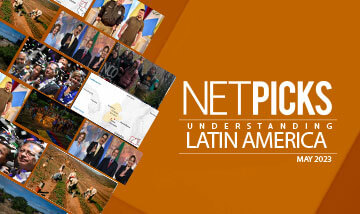Understanding Latin America
Dear readers and colleagues, this month we bring you five articles that reflect the reality of Latin America: one each from Peru, Colombia, Ecuador and two articles about Brazil, including a review of President Lula’s first 100 days in office and the complications of his crack down on illegal mining.
- How Peru Used Lethal Force to Crack Down on Anti-Government Protests
- A Conversation with ELN Commander and Peace Negotiator Aureliano Carbonell
- The Small Matter of Suing Chevron
- Brazil tackles illegal miners, but finds their mercury legacy harder to erase
- Brazil: 100 days Lula
.
HOW PERU USED LETHA FORCE TO CRACK DOWN ON ANTI-GOVERNMENT PROTESTS
Over the course of five weeks of anti-government protests in Peru, security forces repeatedly responded with what experts call excessive force. This included firing shotguns and assault rifles at protesters and killing unarmed people hundreds of feet away. A New York Times investigation closely examined eight deaths in December and January in three locations in Peru where protests were heaviest, to show how military and police used these deadly tactics repeatedly, often violating their own protocols of how to respond to protests. Forty-eight civilians have been killed in the ongoing protests in Peru, and 970 have been injured, according to the country’s ombudsman. Most of these deaths were caused by firearms, the NYT investigation found. Peru’s deadly protests began in December, after President Pedro Castillo tried to dissolve congress and rule by decree, but he was ousted from office before he had a chance to do so. Supporters of Castillo immediately took to the streets across the country, but protests have been the strongest in the southern provinces, where Castillo has his main support base. The NYT analyzed hundreds of videos and images, reviewed autopsy and ballistics reports, and spoke to witnesses and experts.
Brent McDonald & Ainara Tiefenthäler, March 16, 2023
.
.
A CONVERSATION WITH ELN COMMANDER AND PEACE NEGOTIATOR AURELIANO CARBONELL
As the Colombian government undergoes it’s second round of peace talks with the guerrilla group the National Liberation Army (ELN), NACLA sat down to interview the ELN’s second in command at the negotiating table, guerrilla commander Aureliano Carbonell (alias Pablo Tejada). Commander Carbonell is a sociologist by training and considered one of the organization’s leading intellectuals. In this interview, Carbonell situates the peace talks in this particular moment in history, what brought Colombia to this moment that allowed for the left wing President Gustavo Petro to be elected into office and the peace talks to even be possible. He also reflects on past administrations that sought to escalate violence in Colombia by supporting armed actors – with the help of the United States – with nefarious interests, like paramilitary groups. The second round of the peace talks ended March 10, and it’s unclear when the third round will begin. At the negotiating table, both the ELN and the government seek to advance a bilateral ceasefire, but it should be pointed out that observers of the peace negotiations have criticized these ceasefires for not actually being enacted in many parts of the country. The ELN and the government also seek societal participation in upcoming dialogues, and the implementation of educational materials about Colombia’s peace process, with hopes of forging a route towards lasting peace. What does the guerrilla commander see for the future of the country?
Jenaro Abraham, March 9, 2023
.
THE SMALL MATTER OF SUING CHEVRON
In 1993, a group of Ecuadorian villagers filed a lawsuit against oil and gas giant Chevron Corporation over contamination in the northern Amazon. Nearly two decades later, an Ecuadorian judge ruled in favor of the villagers, demanding Chevron pay $9.6 billion, the majority of which to be used for environmental remediation. Chevron refused to pay, and what came next has been an over three decades long legal battle between the oil giant, the villagers and their lawyers, which continues today. In this article, the author reviews a new book by anthropologist Suzana Sawyer, The Small Matter of Suing Chevron, which takes readers through this legal process, explaining how Chevron has managed to use the US legal system and international arbitration procedures to their advantage, to escape this guilty verdict. According to Chevron, the 2011 ruling in Ecuador was procured through fraud, which several judges in the US and Canada have since maintained. The book contextualizes this legal battle within broader debates about oil toxicity, public health and legal ethics, and how Chevron’s refusal to pay for remediation procedures has left a massive environmental and humanitarian crisis untreated. The book is a call to action to think beyond law to achieve social justice, while participating in the ongoing work to change the laws, writes the reviewer. How can we do this entail exactly?
Lindsay Ofrias, March 24, 2023
https://nacla.org/small-matter
.
BRAZIL TACKLES ILLEGAL MINERS, BUT FINDS THEIR MERCURY LEGACY HARDER TO ERASE
In January, newly re-elected President Luiz Inácio Lula da Silva declared a humanitarian crisis in the Yanomami Indigenous territory in the north of the country, due to the massive influx of illegal gold miners entering and destroying the land. Several security missions have since entered to clear the area of illegal miners, but experts have found that the mercury they use in their operations has left a lasting impact on the territory. The small scale miners use the heavy metal to separate gold from ore, then burn it off, and the mercury waste then ends up in the air, vegetation and water. Experts have long been watching this effect in places like the Tapajós River, a major tributary of the Amazon river, where the mercury waste undergoes a transformation into methylmercury, a toxic substance that can move up the food chain, concentrating in carnivorous fish. This is not only hazardous to the environment, but also local communities who live off these rivers. So, while there may be fewer miners in the Yanomami territory, and President Lula is being praised for cleaning up the region, experts are saying it will take a wide variety of initiatives to really restore the area. New technologies are being developed to filter mercury from the environment – but can these be viable solutions for Yanomami territory and the rest of the Amazon that has also been seeing a boom in illegal mining over the years?
Sean Mowbray, March 16, 2023
.
MANY COMPROMISES, EMPTY STATE COFFERS, MANY OPPONENTS
Brazil President Lula da Silva’s third term in office got off to a bit of a bumpy start, but his first 100 days in office have been relatively positive, says the author. After his narrow election victory at the end of October last year, President Lula had to use all his negotiating skills to put the new government on a stable footing. Both Brazil’s Parliament and the Senate are dominated by center parties who don’t represent an obvious support for Lula’s left-wing government. Nevertheless, after exploratory talks and negotiations, Lula was able to win over several parties in the center-right spectrum. This has allowed him the political leeway at the beginning of the year to become capable of taking action in areas of budget policies and the appointment of important commissions. Despite these successes, another goal must be achieved quickly for Lula to maintain control of the country: that of stabilizing the economy and creating more jobs and tax revenue. If Lula’s government is not able to do this quickly, supporters of former president Jair Bolsonaro could rise up again and cause the country to relapse into a polarization and confrontation, writes the author. Could it even lead to another electoral victory for Bolsonaro in the future?
Andreas Behn, April 4, 2023




